#Cherian George
Text
Protecting women and girls from tobacco and alcohol promotion
Protecting women and girls from tobacco and alcohol promotion
Emma Feeny, advocacy director1,
Katie Dain, chief executive officer2,
Cherian Varghese, cross-cutting lead, NCDs and special initiatives3,
George A Atiim, researcher4,
Dag Rekve, senior technical officer3,
Hebe N Gouda, project officer3 5
1The George Institute for Global Health, United Kingdom
2NCD Alliance, Switzerland
3World Health Organization, Switzerland
4United Nations…
View On WordPress
0 notes
Text
探讨新加坡执政党未来方向的《威权政治之困境》
颜汉霖 2022-7-4
https://www.facebook.com/permalink.php?story_fbid=123301497069345&id=104660478933447
即便两位作者基于人民行动党的利益而提出改革的方式,但人民行动党真的会愿意进行改革吗?在这种情况下,相信人民行动党会因此自我改革,在我来看,未免也过于乐观。关键依旧是新加坡公民社会以及在野党的步步紧逼,唯有让人民行动党处于不得不改革的境地,才能够让他们有改革的动机。
《威权政治之困境》是PAP vs PAP: The Party’s Struggle to Adapt to a Changing Singapore的中文版本,作者是施仁乔(Cherian George)和刘浩典(Donald Low),译者则是季风带主编邝健铭。
施仁乔曾经是新加坡《海峡时报》(The Straits…
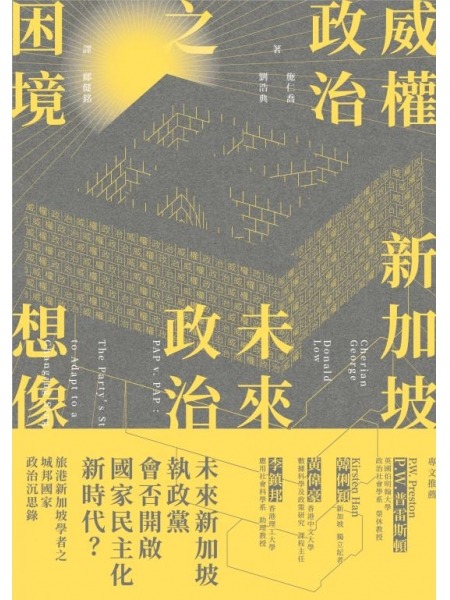
View On WordPress
0 notes
Text
52nd Kerala State Film Awards: Biju Menon, Joju George, Revathi Win Top Acting Honours
52nd Kerala State Film Awards: Biju Menon, Joju George, Revathi Win Top Acting Honours
Biju Menon and Revathi bag top acting honours at Kerala State Film Awards.
Thiruvananthapuram: Kerala’s Minister for Cultural, Fisheries and Youth Affairs Saji Cherian announced the winners of the 52nd Kerala State Film Awards on Friday. The jury for this year’s edition was headed by filmmaker-screenwriter Saeed Akhtar Mirsa. Popular actor Biju Menon and upcoming actor Joju George shared the…
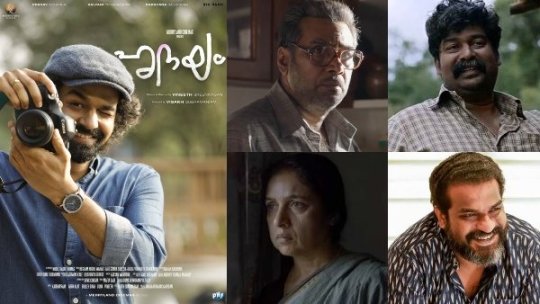
View On WordPress
0 notes
Link
Singapore’s two main public universities have risen in global reputation, lifted by the state’s economic might. For most Singaporeans – as well as many of the region’s brightest students – getting a place to study at the National University of Singapore or Nanyang Technological University is a proud accomplishment. In several fields, our universities have become research powerhouses, worthy of mention alongside the traditional brand names of the West.
But the NUS and NTU suffer from stunted development. Even as they rise in global rankings, their contribution to the country’s intellectual life is relatively modest. Particularly in the humanities and the social sciences, they are largely absent precisely when their expertise is most needed – when complex and controversial issues call for the clarity, context and research-based insight that we academics claim to be able to provide. This retreat from the public sphere has been so complete and enduring that it is no longer noticed. It doesn’t occur to most Singaporeans that our universities could be playing a much broader social role.
I hasten to clarify that the public shouldn’t expect university departments to replicate thinktanks, which are meant to insert themselves directly into current policy debates. Given how compressed news cycles are getting, with controversies exploding and fizzling out within a week, it would be a mistake for academics to flit about, reacting to every matter that grabs people’s attention. That shouldn’t be the job of serious scholars.
But a strong university department or scholarly association should be visible in major public debates that are relevant to its field. At the very least, universities should be able to serve as honest brokers, convening discussions on challenging topics. After all, they are the only institutions in our society that give their employees the time and resources – largely taxpayer-funded – to think differently. They are not pressed to arrive at policy positions. They are not required to be popular or profitable. They can examine problems deeply, challenge conventional wisdom, clarify issues, offer insights that are counter-intuitive and keep contrarian viewpoints bubbling on the back burner for future reference. One might even say that they have a moral responsibility to do all this.
Singapore’s two public universities have very busy calendars, but their activities focus on non-Singaporean matters. While many other universities are seeking desperately to overcome their parochialism and climb university rankings by internationalising, ours have the opposite problem (rankings organisations don’t really measure a university’s local relevance – it probably hasn’t occurred to them that universities might fail to be local enough). Singapore has already emerged as one of the top centres of learning for anyone interested in Asia; it is academia’s contribution to Singapore’s own intellectual and cultural life that is lacking. Consider, for example, the government’s move to amend the Constitution to reserve presidential elections periodically for candidates from Singapore’s racial minority groups. There were individual academics interested enough to make submissions to 2016’s Constitutional Commission, but the activity fell far short of what would be considered normal elsewhere, perhaps for want of a critical mass of such scholars. In a different setting, universities would have been falling over themselves to convene public events to discuss such a major move before the parliamentary vote. Legal scholars and political scientists would explore constitutional implications and issues concerning political representation. Sociologists might want to showcase their research into ethnic identity and politics. For anthropologists, this could be an opportunity to share their research on the construction of race. In a normal developed country, local universities might run a series of public seminars on such subjects. Not in Singapore.
Some Singaporeans might feel that there is nothing wrong with universities staying focused on teaching enrolled, fee-paying students without the distractions of public outreach. But one can’t really compartmentalise a university’s mission this way. Universities have to fertilise the soil they depend on. Just as our national orchestras give free concerts at the Botanic Gardens to help cultivate an appreciation for music, research universities need to be out there showing the public that their intellectual work is worth supporting. Furthermore, schooling that’s confined to textbooks and classroom learning, by professors who show no interest in the real world passing by their window, wouldn’t amount to much of an education.
The lack of engagement in the local can compromise institutions’ ability to mount even basic Singapore-related courses. Our universities do have a Singapore studies requirement in their undergraduate curricula, but departments often struggle to mount relevant courses, sometimes relying on adjuncts or faculty borrowed from other departments. When I worked at NTU’s communication school, I taught a freshman course called Media in Singapore, introducing all communication majors to our media industries and their political, economic and cultural contexts. Since the school’s founding, this course – or earlier iterations of it – had been considered important enough to be listed as a compulsory module. But when I left, the school didn’t consider it a priority to find a replacement teacher. It simply dropped the course. After a year, the course was revived – but no longer as a core requirement; it became an elective.
The most disappointing case of going regional and global at the expense of the local must be political science at the NUS. I’ve followed public forums on local politics for decades. In recent years, one thing that has become practically guaranteed is that none of the speakers on Singapore politics will come from the NUS department of political science. To understand why, visit the department’s website and study the faculty profiles. At the time of writing, of 29 full-time faculty members, only one – a veteran now in his sixties – claims Singapore’s domestic politics as a research interest. In contrast, 22 colleagues – including all seven assistant professors – do not have “Singapore” anywhere on their research profiles or publication lists. Just five of the department’s scholars list at least one published work with “Singapore” in the title, and only two of these publications are more recent than 2013. You have to go back to Chan Heng Chee in the 1980s to find an NUS political science don who has made a seminal contribution to our understanding of Singapore politics. It’s a situation that would be unthinkable in virtually all developed countries.
Political science is an extreme but not unique case. If you scanned the research interests and backgrounds of faculty in NUS economics, for instance, you’d have a hard time guessing which country or even region the department belonged to. You might think it was based in Greater China, or perhaps in a US university with an Asia-Pacific focus. When I checked one commonly used database of scholarly articles, I was able to find 152 articles on Singapore categorised under “economics” published since 2015, but only one was by someone currently listed as a regular faculty member of the NUS economics department. The NUS accounted for about 30 other articles, but these came from elsewhere on campus, such as the public policy and business schools, and the real estate department.
NTU’s history department website suggests that perhaps three out of 22 faculty members could claim a focus on Singapore history. The history department at the NUS is more illustrious but is nevertheless short on local expertise. Consider the books that have been published on Singapore history: the National Library has compiled a useful bibliography. Of the 27 recommended titles covering Singapore’s history up to 1964, just one is (co-)authored by a current faculty member of the NUS history department.
There are two fairly obvious reasons for our universities’ C-minus performance in Singapore studies: the lack of academic freedom and the absence of a Singaporean core in many departments. Political restrictions date back to the first decade and a half of independence from Malaysia, in the 1960s and 1970s, when the government cracked down on activism in what were then the University of Singapore and Nanyang University. From the ashes, the new NUS and NTU rose like phoenixes – with a permanent phobia of the fires of politics.
In many fields, academics are also thwarted by a lack of access to government data. For this reason, one can hardly blame economists for choosing not to specialise in Singapore. Historians have a different problem. They know too much. Declassified British records in London offer a rich vein of evidence concerning Singapore’s pre-independence history – but mining this lode puts historians on a collision course with the government’s official narrative. Sadly, this has meant that young academic historians of Singapore are able to find work more easily outside the country.
It would be simplistic, however, to blame only the government. The universities’ problems are partly own goals scored by administrators obsessed by the research productivity game. This rewards those who churn out papers in so-called top-tier journals, ignoring the fact that these journals are published in, by and for the West. To illustrate how this bias works in practice, consider an American political scientist writing a 6,000-word article about voting patterns in Ohio. He can quickly get to the heart of his findings and theoretical contributions. In contrast, a scholar researching Singaporean elections would have to devote half her paper to justifying why Singapore is worth studying, and would need to explain the local context in painstaking detail for an audience of mystified journal editors – all before she’s finally able to discuss her actual study. The problem is compounded by the fact that the off-the-shelf theoretical frameworks currently in circulation were mostly developed in the US and Europe and might not fit Singapore. It’s therefore much harder for scholars working on Singapore to sail on the main theoretical currents in their fields.
This bias results from the uneven distribution of power in global academia. The US and its concerns lie at the core of most disciplines; the rest of the world is peripheral. It is a frustration familiar not only to scholars of Singapore, but also to academics in Australia, the UK, Hong Kong and elsewhere. In these other societies, however, universities put up stiffer resistance to the imposition of key performance indicators that would undermine their core mission to study their own locales. Top-tier journal publication is still prized – but not at the expense of neglecting impactful local research or teaching needs. Our universities could do the same, prioritising Singapore-focused research even if it is likely to generate lower citation scores. Bibliometrics are not ends in themselves, but merely crude proxy measures for research impact. Our university leaders and education policymakers are free to adopt different yardsticks. As things stand, the metrics don’t encourage research into our own milieu. Furthermore, it is an open secret that, in many departments, hiring and promotion decisions focus more on a candidate’s research numbers than on what he or she is able to teach – hence the problem of not having enough faculty to teach Singapore content well.
Responding to these market signals, many locals and almost all foreigners decide to focus on regional or international topics or on purely abstract theoretical work that is not grounded in any particular context. There are still scholars who, despite the disincentives, persist and study their first love – Singapore. But in many social science and humanities fields, they lack clout. The situation suits the foreign faculty who now dominate departments – and in many cases run them. Singapore is the only place in the world where foreigners can work at a top-ranked university without feeling any shame at knowing nothing about their host society; where, indeed, such ignorance is often more of an asset than a liability.
Singaporean economists Pang Eng Fong and Linda Lim have similarly commented on the lack of a strong local core in our universities ( “Singapore’s fling with global stars sidelines local talent” , News, 24 August). But one shouldn’t jump to the conclusion that foreign faculty as such are a problem. It’s simplistic to equate local origins with local commitment. Some foreigners have had a transformative impact on Singapore studies. The NUS archaeologist John Miksic is a prominent example. Others have been conscientious institution-builders for Singapore. I personally benefited from the mentorship of two such giants, Taiwan-born sociologist Eddie Kuo, the founding dean of NTU’s communication school, and historian Anthony Reid from New Zealand, founding director of the Asia Research Institute at the NUS. Philip Holden, a professor of English at the NUS, is another model foreign-born scholar. He became a respected authority on the Singapore literary scene. But after more than 20 years, he began facing problems maintaining his permanent resident status. When his application for citizenship was denied, he and his Singaporean wife decided to relocate to Canada. Hearing this sad news, a former student who had become an English teacher commented on his Facebook wall: “Without you, a generation of Singaporeans wouldn’t have known what SingLit was, and SingLit would be nowhere near what it is today.”
Whatever the mix of reasons for the lack of emphasis on Singapore-focused work, the overall pattern is striking. The government’s new Social Science Research Council is trying to come to the rescue with substantial funds earmarked for research relevant to Singapore, but the problem has never been money. Grants alone won’t counterbalance the factors weighing against independent research on Singaporean society, especially if, as with arts funding, the council denies money to projects that are seen as critical of the government.
The university has a role that goes beyond equipping and credentialing students for employment; beyond serving the needs of industry; and beyond developing its region’s pulling power as an educational and research hub – all great strengths of the NUS and NTU. It also has a civilising mission, to show how the pursuit of knowledge and reasoned deliberation are the best ways for a society to manage its contemporary and future challenges. This can be achieved only if a university is engaged with the society of which it is part. And this is where Singapore’s institutions of higher learning should do much more to live up to their stratospheric global rankings.
Cherian George, a Singaporean, is professor of media studies at Hong Kong Baptist University. This essay is an edited extract from his new book, Singapore, Incomplete: Reflections on a First World Nation’s Arrested Political Development (Singapore: Woodsville News, 2017).
42 notes
·
View notes
Text
PARAPARANE - Nanmakaloronnum Nalkiyathorkkumpol
PARAPARANE – Nanmakaloronnum Nalkiyathorkkumpol
Lyrics: Nanmakaloronnum Nalkiyathorkkumpol Nandiyalennullam Thullidunne Arhathayillathe Manichathorkkumbol Kannukal Eeran Aninjidunne Nediyathonnumilla Sarvvavum Danamallo Yeshuve Nin Sneham Ethra Valuthu (2)Paraparane Paraparane ParaparaneAngaye Vazhtheedunne (2)
Abba Pithavennu Vilichapekshippan Puthrante Athmave Thannathinal Ethu Nerathilum Ethu Samayathum Athidhairyathodini Aduthuchellam…
youtube
View On WordPress
#Antony George#christianmedia#christianmedias#Immanuel Henry#Joel Marshall#Malayalam christian song#malayalam christian songs lyrics#Sabu Cherian#Youtube
0 notes
Photo
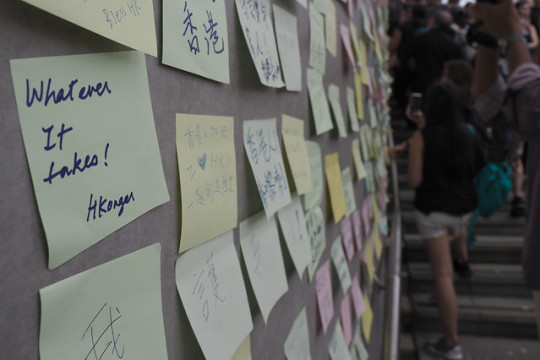
Photo: Untitled (Hong Kong), by Cherian George (http://bit.ly/2xa5ak5)
12 notes
·
View notes
Text
MENYIKAPI DEBAT DI MEDSOS
Tahun politik adalah "tahun panas". Dan nampaknya semenjak pemilihan gubernur DKI, setiap tahun menjadi tahun politik. Perdebatan di sosial media selalu panas, namun tidak pernah sepanas bulan-bulan belakangan menjelang pemilihan presiden.
Kata-kata konfrontatif seperti "goblok", "bakar", "bangsat", "sontoloyo", "tolol", "bajingan", "bunuh", dan lain-lain membanjir lini masa sosial media kita. Bahkan hewan yang tak bersalah sama sekali seperti anjing dan babi,terseret-seret mulut dan jempol manusia yang tidak bisa menahan nafsu marahnya di status-status dan komentar-komentar.
Siapapun terlibat mulai anak sekolah sampai profesor, dari guru sekolah sampai anggota DPR. Pria, wanita, besar, kecil, miskin, kaya, pengangguran, pensiunan, artis, mantan artis, karyawan, wiraswasta, ASN, dosen, semuanya seperti tersihir keajaiban Whatsapp, Twitter, Instagram, dan Facebook untuk menumpahkan sumpah serapahnya. Tentu saja termasuk saya.
Isu agama mudah bangkitkan emosi
Harus diakui, sulit untuk tidak terprovokasi status-status bersliweran setiap detik. Jempol ini selalu bernafsu komentar, berdebat dan berkelahi. Karena berkelahi di sosial media tidak punya konsekuensi fisik, tidak perlu melihat wajah marah lawan debat.
Berbeda kalau debat beneran, atau berkelahi beneran. Seperti provokator yang saya jumpai hari Kamis minggu yang lalu. Orang tidak punya nyali pun seperti singa atau harimau di dinding facebook.
Begitu ditantang ngobrol langsung tiba-tiba bungkam. Situasi semacam ini dengan gampang ditunggangi para petualang politik yang menghalalkan segala cara demi kursi kekuasaan.
Mulai dari isu PKI, segala macam hoax, dan yang terakhir pembakaran bendera. Kenapa hampir semua isu terkait agama? Karena isu ini sensitif dan paling mudah membangkitkan emosi.
Eksploitasi identitas kelompok
Cherian George, dalam bukunya “Hate Spin”atau diterjemahkan menjadi Pelintiran Kebencian menegaskan “penghinaan dan ketersinggungan yang sengaja diciptakan,dan digunakan sebagai strategi politik yang mengeksploitasi identitas kelompok guna memobilisasi pendukung dan menekan lawan.”
Nampaknya cara-cara demikian ada kemiripan dengan yang terjadi di Indonesia. Agen-agen kebencian diciptakan, buzzer-buzzer politik bermunculan dengan nilai kontrak ratusan juta.
Itu benar terjadi sekarang, di sekitar kita. Ketika akun-akun palsu, agak palsu, maupun yang asli di sosial media menebarkan tautan-tautan provokasi. Mereka para buzzer berpesta. Sementara korbannya berkelahi satu sama lain, saling membenci satu sama lain.
Lalu bagaimana menghentikannya? Menegakkan keadilan? Keadilan tidak akan tegak hanya dengan mengkoarkan status. Menurut saya, tidak usah berharap dengan sesuatu di luar diri kita.
Mulai dari diri sendiri
Harus mulai dari diri sendiri, harus mulai dari hal-hal sederhana, yang kecil-kecil kalau kata Abdullah Gymnastiar atau Aa Gym. Penulis "Seven Habits of Highly Effective People", Stephen Covey menyarankan mengubah situasi, harus mulai dari hal yang bisa kita pengaruhi, alias mulai dari diri sendiri.
Menurut Michael Mascolo, profesor psikologi dari Merrimack College, Massachusetts, Amerika Serikat. Kebencian tidak dapat dipadamkan dengan kebencian yang lain. Api tidak akan dapat padam dengan mengobarkan api yang lain.
Jadi, bagaimana sebaiknya menanggapi provokasi? Pertama lihat dulu siapa memprovokasi. Tidak ada gunanya menanggapi akun abal-abal, misalnya akun Facebook isinya melulu tautan ujaran kebencian.
Hanya memiliki “friends” sangat minim. Bisa jadi itu akun kloning yang digunakan buzzerpolitik memviralkan isu. Ketika sudah yakin akun yang kita ajak ngobrol bukan akun palsu, punya pemilik benar-benar ada, baru obrolan bisa dilanjutkan.
Ajang debat kusir
Seperti ilustrasi di bawah ini :
Bona (bukan nama sebenarnya): Sebenarnya sangat disayangkan ada aksi pembakaran bendera itu. Banser salah. Tapi tidak bisa sepenuhnya disalahkan. Mereka membakar bendera organisasi terlarang yang diacung-acungkan di depan hidung mereka.
Tentu kita berharap kasusnya akan segera jelas, pihak berwajib juga sudah mengamankan pelakunya. Hati-hati, ini isu sensitif jangan mau diadu domba.
Rong-Rong (juga bukan nama sebenarnya): Lho, kamu itu gimana? HTI tidak punya bendera. Itu bendera tauhid! Mereka melecehkan Islam! Kemana Banser ketika kami membela ulama? Mereka kebanyakan malah menjaga tempat ibadah agama lain! Update informasi dong, jangan sok netral!
Rong-rong merespon dengan emosional, tidak dalam konteks yang sesuai dengan yang disampaikan Bona. Justru menyerang pendapat Bona yang dengan gegabah dianggap “membela” Banser. Obrolan kemudian menjadi tidak efektif dan berpotensi menjadi ajang debat kusir. Rong-rong menekankan pemikiran “kami versus mereka”.
Otak berhenti berpikir kritis
Menurut Prof. Mascolo, serangan personal semacam ini merusak inti diskusi yang ingin dibangun Bona, bahkan menuding Bona tidak peduli dengan agamanya sendiri. Tentu saja hal ini bisa memprovokasi Bona dan melupakan bangunan diskusi yang ingin dibangun di awal.
Bona: Justru HTI yang membajak kalimat tauhid dalam benderanya, seperti juga ISIS, Al-Nusra, mereka mensponsori pemberontakan di Suriah, di Irak, di Yaman. Yang ada hanya kehancuran. Makanya banyakin baca dong! Jangan cuma baca link ga jelas!
Pada titik ini, diskusi sebenarnya sudah tidak ada gunanya. Serangan personal membuat individu semakin defensif, semakin emosional. Ketika itu terjadi. otak berhenti berpikir kritis, yang berfungsi adalah amygdala.
Amygdala adalah bagian otak paling primitif, yang pola pikirnya adalah flight (lari) atau fight(berantem) ketika menghadapi ancaman. Seperti otak rusa atau zebra yang melihat predator.
Menang tanpa menyakiti
Kita harus menghadapi kebencian dengan kemauan untuk melihat kenapa seseorang membenci sesuatu, apa motifnya. Untuk menuju ke sana tidak bisa dilakukan tanpa menjaga hubungan personal. Misalnya dengan menawarkan sebuah pertanyaan terbuka.
Bona: Sebenarnya sangat disayangkan ada aksi pembakaran bendera itu. Banser salah. Tapi menurutku tidak bisa sepenuhnya disalahkan. Mungkin kamu punya pendapat lain. Bagaimana menurutmu Rong-rong? Apakah ada cara supaya kita tidak diadu domba?
Kita bisa perhatikan, materi ingin disampaikan Bona sebenarnya sama, tapi caranya berbeda. Bona menanyakan pada Rong-rong dengan memposisikan sebagai orang sejajar. Tidak lebih tahu.
Dari sana diharapkan Bona lebih tahu apa yang dipikirkan Rong-rong. Meski keduanya tidak saling setuju. Tapi setidaknya keduanya setuju untuk tidak saling setuju. Sehingga diskusi tidak terperosok menjadi konflik tidak perlu.
Dalam istilah jawa “menang tanpa ngasorake”. Menjadi pemenang dengan tidak membuat orang lain merasa kalah. Istilah keren yang mungkin mendekati adalah win-win solution. Selamat berdiskusi.
1 note
·
View note
Text
Event Analysis: Hate Crimes in India
SUMMARY
Hindu nationalism in India is not a new phenomenon. From Cherian George’s book, “Hate Spin: The Manufacture of Religious Offense and its Threat to Democracy,”, it began its comeback with the Bharatiya Janata Party (BJP), formed in 1980. Beginning in 2014 and still to this day, Narendra Modi sits as the prime minister of India and provides a face for the Hindu-nationalist discourse. Like any nationalist organization, there are the oppressor and the oppressed, who, in this case, consist mainly of Muslim people in India. On April 18, 2022, Hindu devotees gathered to march, celebrating the Hindu festival Hanuman Jayanti. Now, there was a previous agreement between the Hindu and Muslim residents in Delhi’s Jahangirpuri district to avoid the local mosque, but that was ignored.
“A Hindu mob smashed beer bottles inside the mosque, put up saffron flags there, and chanted Jai Shri Ram [Hail Lord Ram],” said Tabreez Khan, 39, a witness. “A caretaker of the mosque started resisting them, leading to a brawl. It was only after they started to desecrate the mosque that Muslims got angry and clashes started and stones were thrown.”
Even though the perpetrators were part of the Hindu-nationalist mob, the majority of those arrested were Muslim. Many bystanders and Muslim people involved note that it was not a religious rally, but an attack on the Muslim people. It was a hate crime.
SIGNIFICANCE
“Fueled by Hindu nationalism, encouraged by authorities and carried out with impunity, oppression of Muslims has become so pervasive in India that experts said it is undermining the country’s standing as the world’s largest democracy and raising doubts about its future as a secular state.” Now, looking back in history, populists leaders have been associated “with dangerous manipulation by the leader and alarming irrationality on the part of the led” (Canovan, 1999, p. 6). The situation in India mirrors other nationalist regimes in places like the United States where Donald Trump and white nationalists are spreading hate and violence against oppressed groups in the country.
It is important to note the significance of having higher power, one who rules the government and the majority of the media, continuously boosting the narrative. In a nutshell, the current state of Hindu nationalism in India, as it has developed over the past years, has led to an upsurge of the patriotic and democratic ideas that formed the cultural and ideological base for India’s original independence movement to separate from the British raj.
LINK TO POPULISM AND THE MEDIA
Luca Manucci speaks to the relationship between populism and the media, which “considers the effects of populist messages diffused by the media as a threat to the quality of democracy” (Manucci, 2017, p. 467). In the case of India, where Modi has effectively made use of media and social media outlets to spread his discourse, there has been an increasing threat of losing secularism in the country. As a country that has been democratic since its independence in 1947, India seems to currently be headed away from its founding ideals. Like Manucci said, the media helps to spread the Hindu-nationalist ideas, as well as refrains from broadcasting any anti-nationalist discourse, as Modi and the BJP overlook the media censorship. In addition, this makes it increasingly more dangerous for journalists coming to India to research topics like nationalism, democracy, or secularism. Overall, India has seen diminishing freedom of religion and freedom of speech through increasing hate towards minority groups and the spread of journalism and news exposing that very hate.
0 notes
Text
乌克兰战争:复杂的公众舆论揭示了两极分化、傲慢和同理心的缺失
作者:施仁乔(Cherian George) 译者:新国志 2022-3-13
https://www.academia.sg/academic-views/war-in-ukraine/
在新加坡政府明确谴责俄罗斯入侵的背后,一些新加坡公民对乌克兰的困境不屑一顾。这种反应暴露了他们对新加坡自身主权基础的失忆。
1965年9月21日,新加坡外交部长拉惹勒南在联合国大会上发言,当时大会一致投票接纳新加坡为联合国第117个会员国。
没有一个国家的边界与种族、语言、宗教或其他文化分界线是完全一致的。它们可以被称为社会建构(social…
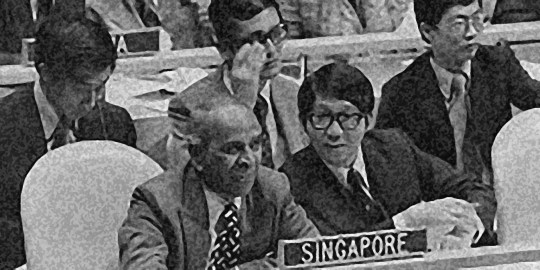
View On WordPress
0 notes
Text
Customer Reviews
“Rohita, I received the parcel last night. Opened it in haste . Found them lovely. Today after my morning session I looked at all the items. Fabulous . Just what I wanted. The packing was superb. Well and tightly packed. No damage.Thank you. May God continue to bless you and your talents.”
-Ms.Sneha Zachariah, Kottayam
“Each one is beautifully crafted. really is perfect. A real work of art and brilliance👸: I mean it, I don't believe in flattery. Thank you.
-Ms.Mary George, Mumbai
“Its really beautiful. Loved it.”
-Ms.Sneha John, Kochi
“My dear Rohitha, may I first congratulate you for what you have achieved in life, for your God given talents, for the support of your dear family, for your sincerity and determination "to give of your best to the Master"and for your humility which has enabled you to reach your goal.Our hearty congratulations and best wishes in your future endeavours as well.The book you have brought out about St.Thomas the Apostle is an excellent art narrative and very picturesque, easy to understand and attractively presented.God bless you.The desk calendar is a valuable treasure and we will always remember you when we look at it daily.Thank you once again. God be with you.”
-Dr.Thomas and Indira, Kozhikode
“My dear Rohitha. It’s been a long time that I have been wanting to write to you and express my sincere appreciation of your talents. You are not just gifted but you have been using your gifts to the best of your abilities. That’s the important thing. There are many who are gifted but only a few use the gifts given to them. Your painting skills, craft skills and now the training programs that you have been doing is truly amazing. May God continue to bless you with talents and gifts that you will use to the fullest for the benefit of mankind.”
-Mr.Kurson Kurian, Chennai
“The products included in this site are precious as evident in the detail and love the artist puts into her work. The vivid colours, intricate details and use of different techniques enhance every day objects used around our home. They bring an added touch to kitchens, dining tables and to holidays. I absolutely recommend a visit to this site every few weeks to find surprising additions.”
-Ms. Bindu Cherian, Valrico, Florida
“Rohitha,I love using the tea-coasters. I love the design on them it’s beautifully painted.I love that it’s made out of wood.Gives it an earthy feel. Very easy to maintain and I think it will last long. Thank you.”
-Ms.Divya Mahato, Goa
“Loved the wooden keychain with lovely painting. A nice piece of art as a key chain.”
- Ms.Nirupama Shukla , Mumbai
“Beautifully painted wooden keychain. Loved the art by kriyations.in
Thanks!”
- Ms.Sunita Bhatia , Mumbai
“Dear Rohitha, I liked the tea coasters that you supplied recently. I gifted the tea coasters to some of my friends. They loved it and were appreciating the colour combinations of the work and your talents.I received the calendar of Kriyations. Your paintings printed on the calendar are excellent!”
- Ms.Ann R Cherian, Coimbatore
“Kriyations.in always creates magic .loved the key chain and the fridge magnet such beautifully painted all those details n colours..love it”
- Ms.Binu Saby ,Goa
“We have seen so many types of keychains, but this 1 is really different n unique. Such a beautiful hand painting on a wooden keychain. Thank you kriyations.in for the lovely art work”
-Ms.Jagruti Sonawane, London
“Loved the intricate work incorporating traditional motifs, beautiful Kriyations !! 👌🏽👌🏽My daughter Sarah loves it and told her that she can inherit 😃”
-Dr.Thara Sebastian
Kriyations.in has one of a kind handcrafted items with great attention to detail and intricate crafting. Perfect for sprucing up your house or as gifts for loved ones.
-Abhishek Das, Bangalore
Each piece of yours has got a personal touch.Passionately designed, beautifully crafted and the colour combinations just enhances the beauty of it.. With intricately drawn elements your painting speaks volumes .. Well done Rohitha.. May you scale more heights dear..👍🤗😍👏🙏
-Anu Jose, Bahrain
0 notes
Text
January Books
The thirteenth month of 2020 is coming to close and I managed to read yet another book about a global pandemic (Ocean of Minutes by Thea Lim), dip my newbie toes into Henry VIII’s love life (Wolf Hall by Hilary Mantel), experience the weird weird weird world of Jeff VanderMeer (in Dead Astronauts), and pick up a self-published collection by two local - but not residing in Singapore - academics, Cherian George and Donald Low (PAP v. PAP).
For my thoughts in video form check out my YouTube video: https://youtu.be/MdG8O81QPYQ
Ocean of Minutes by Thea Lim
Somehow I managed to read four books set during a global flu-like pandemic over the past several months. I finally figured out that this is not because authors are suddenly gripped by the subject, but that these books always existed and are now coming to the fore. I was eager to pick this one up because it's written by a Singaporean-Canadian author and it was mentioned to me by my friend Daryl.
Ocean of Minutes turned out to be the most depressing of the flu books I’ve read, with the main character Polly never catching a break. Polly has time traveled to the future in a kind of indentured servitude to work for the company that will also provide the treatment for her boyfriend Frank who has caught the flu and must remain behind. They pick a meet up location for when Frank’s timeline has caught up to Polly’s.
Lim uses this premise to critique the treatment of workers under capitalism, and the callousness of the immigration system in the US. It’s also a neat vessel for reflections on love, and whether Frank and Polly’s young romance can stand the test of time, and their struggles apart from each other. Highs for me included the tender and realistic depiction of the early days of Frank and Polly’s relationship. Lows included the hamfisted manner in which Lim critiques the systems that strip us of our humanity (these scenes of despair mostly served to move the plot along rather than build an organic sense of indignation), and the frustrating naiveté (borderline cluelessness) of Polly.
Rating: 3.5/5
Wolf Hall by Hilary Mantel
I am very late to the game on this one. Everyone, including both of my parents, read Wolf Hall when it first came out in 2009 (to critical acclaim). This first book of Mantel’s trilogy is a dramaticized history of 1500-1535 England through the lens of Thomas Cromwell, a well known advisor to English archbishop and Catholic cardinal, Thomas Wolsey, and later to Henry VIII. Key events covered include: Wolsey’s downfall, Henry’s infatuation with Anne Boleyn (and her maneuverings to become Queen), and the many executions of heretics, traitors, and fallen politicians.
Thomas Cromwell really comes alive as a cosmopolitan and industrious man, and there is some gut wrenching writing from Mandel, but I think you need to already have a relationship with this history in order to really fall in love with this book. Every mega fan I know is British, and someone in my book club summed it up perfectly by calling Wolf Hall the “Hamilton: An American Musical” for Brits. To have history that you’ve known all your life, but only in a superficial way, sketched out with such detail and drama is a kind of drug. Unfortunately I didn’t even know Henry VIII had six wives until reading this book, so I remained mostly immune. My early 16th century European history is quite up to snuff now though, so feel free to quiz me.
Rating: 3.8/5
Dead Astronauts by Jeff VanderMeer
This is the weirdest book I’ve read in ages. Dead Astronauts is book two of VanderMeer’s Bourne trilogy (which I did not realize until later). I picked it up from my local library because I liked the cover and because the first book of VanderMeer’s Southern Reach trilogy, Annihilation, gave me literal goosebumps.
I still have no idea what I read, and there’s not really a plot in this book so much as a bunch of snapshots with recurring characters, which include anthropomorphized animals and the three dead astronauts (only one of which is human, I think). The only thread I can confidently say I understood is that there is an evil Company that has destroyed the natural Earth with terrifying biological experiments that produce Hieronymus Bosch-like creatures. There are multiple realities and universes, and the astronauts are working towards some kind of common goal (but I couldn’t tell you what that is).
But the point of this book is definitely not plot. It’s a book that is meant to creep you out, and leave you bewildered by a slew of environmental horrors (Jeff VanderMeer’s specialty). Through this kaleidoscope of weirdness you get a solidified feeling of the cruelty of humans and the brutality of environmental degradation. The form is also totally unconventional with the use of different fonts, multiple pages of the same words repeated over and over, and passages that read like spoken word. I didn’t really know what was going on most of the time, but sometimes it’s okay to have a book where you’re just along for the ride.
Rating: 3.5/5
PAP v. PAP by Cherian George and Donald Low
I am a Cherian George fangirl and really felt my Singapore politico identity come to fruition when I ordered this self-published collection hot off the presses. The main argument of this volume of short essays by the two academics is that the PAP is here to stay (at least another 15 years) and true reform must come from within the party itself, rather than from external forces or the Opposition. I am not fully convinced this is possible, but if there is any political party enlightened enough to overcome the kryptonite of control maybe it’s Lee Kuan Yew’s.
This was a fun read because it is so recently published and includes all of the events of the most recent General Election that took place in July 2020, but in general I felt that it skimmed the surface (either providing a too-basic overview of issues like economic distribution and democratic accountability, or rehashing well-known arguments). I much prefer George’s Singapore Incomplete, which feels both snappier and better thought through.
Maybe George and Low might have been better served by writing a book solely focused on the case for why reform must come from within (and how, whether that’s possible or even likely, and in-depth examples from other countries), instead of providing short overviews of many different issues. The chapter that offered the freshest view and food for thought was the last one, “Riding the populist tiger,” which dissects how the recent wave of populist nationalism in the world has provided the PAP with a political advantage, but is also a poison that could threaten Singapore’s longer term stability.
I also agreed with George and Low’s appeal for a “PAP that wants to lead not just to rule”. They argue that the PAP must be bold in describing a positive vision for Singapore, rather than continuing to position itself as a protector of Singapore from “its inherent vulnerabilities”. The PAP should be proud of the material success and stability Singapore has been able to accrue since independence, but George and Low are right in saying gone are the days when the PAP can simply rest on these laurels. PAP leaders should address the issues of the day with the confidence and creativity of a dominant party.
Finally, the status and treatment of foreign workers in Singapore received widespread public attention during the Covid-19 pandemic, and I am looking forward to an in-depth treatment of this topic, which George and Low mention only in passing in this book.
Rating: 3.5/5
0 notes
Photo
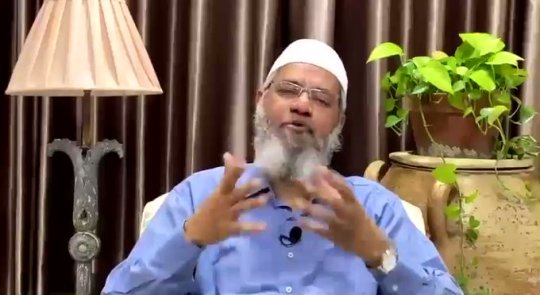
I don't know why @HMOIndia and @DrSJaishankar are twiddling their thumbs and not getting this man from terrorist supporting nation #Malayasia. No palm oil buying until this wicked man is in Delhi @PiyushGoyal https://t.co/16TgsjSSMv
— George Cherian (@ByCherian) October 20, 2020
0 notes
Text
Elections is like choosing your fruits in the supermarket
I think I’ve come up with a pretty good and relatable analogy for #GE2020. Please hear me out.
To choose the best fruits in the supermarket, you have to do your homework to know what to look out for, in order to perform the miscellaneous sensory tests as you hold the fruits in your hands. The perception of what is “best” might differ from person to person, depending on what you are looking out for or what you will be using the fruits for. You might want extra ripe avocadoes for making guacamole or less ripe avocadoes to keep and ripen slowly. You might like less ripe and firmer bananas or riper and softer bananas. But the baseline that everybody can agree upon is that they don’t want rotting or bug-infested fruits.
Similarly for the general elections, we have to do our homework in the form of considering our own values and what we look out for in our leaders when forming our government. We then read party manifestos, listen to debates and ask those in the running questions - akin to the sensory tests we perform - to see if there is a match in what we are looking out for. This can differ from person to person - some might be more concerned with having checks-and-balances in the government while others prefer political stability. Some might want a more redistributive and universalistic social security system while others rather have system that focuses more on self-reliance. But the baseline that we can agree upon is that we don’t want morally dubious characters in our parliament. *ahem*
But of course during elections, the stakes are much higher. We’re not talking just about picking the most suitable avocadoes or bananas for our consumption purposes. We’re talking about our livelihoods for the next 5 years and beyond.
Which brings me to my next and final point - there should be room for constructive criticism and charitable challenging during the elections (and during normal times), for voters to make the most informed decisions. Laws like POFMA, which gives ministers the sole power on the outset - a power delegated to civil servants during the election period - to determine what constitutes the “public interest” (often conflated with “public confidence” in the government’s actions) and therefore a falsehood, comes in the way of that. [1]
Would you think it fair if supermarkets started banning people from smelling fruits, touching fruits (touching, not pinching ah!) and weighing them in the palm of their hands? And if they told customers to just trust them because they stock up on the best and freshest produce in the entire country? Especially if they happen to be the biggest supermarket chain in the country?
[1] Cherian George (2020) “The Dogma Behind Pofma,” pp.177-186 in Air-Conditioned Nation Revisited. (Singapore: Ethos Books). Available at https://www.academia.sg/wp-content/uploads/2020/06/George-2020-Pofma.pdf
0 notes
Text
Coronavirus: Al Ras road closures, heightened restrictions in Dubai explained
The Supreme Committee of Disaster and Catastrophe Administration has introduced elevated restrictions on motion in the Al Ras space of Dubai for 2 weeks from Tuesday 31st March 2020
Picture Credit score: Virendra Saklani/DailyKhaleek
Dubai: Al Ras in Dubai is a hub for wholesale-trading and is among the oldest communities in the emirate.
It’s a densely populated space with slim strolling streets and bustling enterprise actions. Most residents and guests know the world due to Deira Gold Souk and Spice Souk however there’s far more related to this vibrant outdated enterprise hub. It’s a lifeline for merchants dealing in meals supplies. Al Ras is positioned on the western aspect of Deira on Baniyas Road alongside the Dubai Creek.
Al Ras got here to the limelight on Monday after the Dubai authorities introduced elevated restrictions on motion in the world for the following two weeks. The restrictions, which embody road closures and metro cease closures, might be in impact from March 31 for intensified sterilisation procedures.
You will need to be aware that the restrictions in the world are relevant 24-hours for the following two weeks beginning March 31.
In keeping with the Dubai Supreme Committee of Disaster and Catastrophe Administration, motion of residents in the world has been fully restricted. Residents of the world will not be allowed to go away their properties whereas non-residents will not be allowed to enter the world till April 14. All companies in the world will even stay closed for 2 weeks. The choice comes as a part of the UAE authorities’s measures to stop the unfold of the coronavirus.
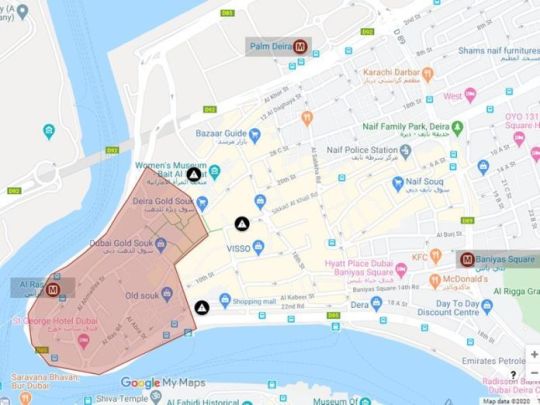
Al Ras in Dubai is topic to strict restrictions over two weeks beginning March 31 with no individuals getting into or exiting the world. Entrances of three roads resulting in the world, Al Khaleej Road, Baniyas Road and Al Musalla Road, have been closed for the interval. Metro stations Al Ras, Palm Deira and Baniyas Sq. have been closed as effectively – no trains on the Inexperienced Line will cease at these stations
Picture Credit score: Dona Cherian/Google Maps
Al Ras – an space information
Al Ras actually means ‘The Cape’ as a result of the world is surrounded by Dubai Creek from a minimum of three sides. The oldest workplace of Dubai Municipality, which is now a museum, can also be positioned in this space. The world is a enterprise and buying and selling hub primarily for the wholesale merchants.
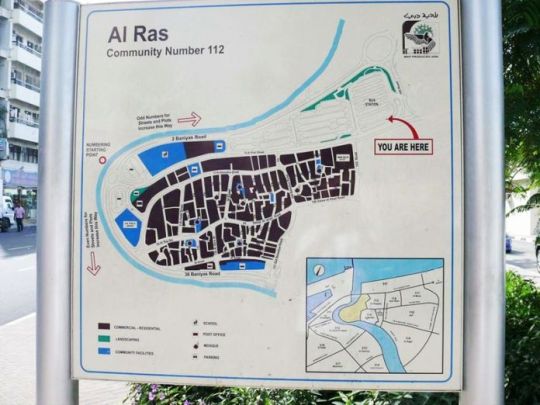
A map of the Al Ras space in Dubai
Picture Credit score: Artistic Commons
Al Ras can also be a well-known vacationer vacation spot in Dubai due to the Spice Souk, Fragrance Souk, Gold Souk, conventional retailers and the heritage buildings. Among the oldest lodges in Dubai together with St. George Lodge and Al Ras Lodge are additionally positioned in this space.
Al Ahmadiya College
Al Ras additionally homes Al Ahmadiya College, the oldest faculty in Dubai. It’s the first nationwide semi-regular faculty in Dubai and was based and established by the late Sheikh Ahmed bin Dalmouk in 1912. In 1994, the Authorities of Dubai restored Al Ahmadiya College and reworked it right into a historic museum. Dubai Public Library can also be positioned in the identical space.
Gold Souk
The Dubai Gold Souk is a standard market in the center of outdated Dubai by the creek. This market primarily sells gold, silver, treasured stones and pearls. The souk is residence to greater than 300 retailers. Additionally it is a must-visit place for vacationers to Dubai.
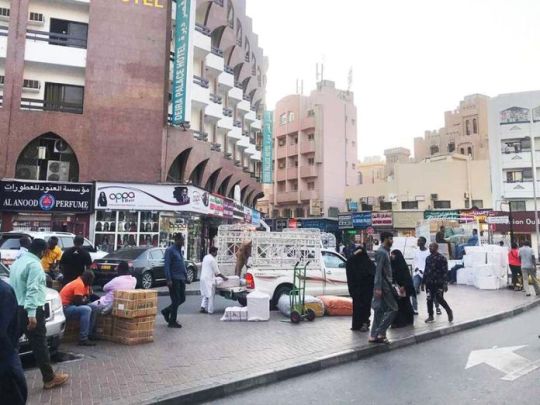
Al Ras space in Deira
Picture Credit score: Ashfaq Ahmed/DailyKhaleek
Fragrance Souk
Al Ras is a centre for fragrance provide in the UAE. The Deira Fragrance Souk makes up a few streets with a lot of fragrance shops that promote oils, fragrances and sandal wooden. Most of them deal in wholesale commerce however there are many retail retailers. The fragrance souk is adjoining to Dubai Gold Souk and is located on Sikkat Al Khail Road.
Spice Souk
The Dubai Spice Souk is the second most well-known wholesale and retail market in Al Ras space. It’s a standard market positioned near the famed Gold Souk. This market primarily sells herbs, spices, soaps and far more. The souk is residence to over 150 small retailers. The place is at all times full, with not solely vacationers but additionally merchants from throughout the UAE.
Wholesale retailers
Most wholesale and retail buying and selling retailers in the world deal in spices and meals objects together with rice, sugar, flour and pulses. Additionally it is well-known for dry-fruit buying and selling in addition to carpets, perfumes, clothes, and so forth.
Since it’s positioned proper on the ‘mouth’ or the doorway of Dubai Creek, dhows carrying meals supplies and different provides from neighbouring nations anchor near the Al Ras space making it a bustling enterprise centre.
Most merchants working are in the world, specifically the Spice Souk, are Iranians whereas Indians and Iranians donimate the foodstuff buying and selling with the considerbaly good presence of Afghanis, Arabs and Pakistanis .
Important provides to residents
For individuals who are apprehensive about shopping for every day necessities, the Common Command of Dubai Police confirmed that groups from the Dubai Well being Authority will present all important provides to the residents of the world in the course of the two-week interval.
Why was Al Ras space closed
The choice to place in place heightened restrictions was taken as a result of excessive density of inhabitants in the world, with the aim of safeguarding the well being and security of residents and to implement the best degree of preventive measures in opposition to COVID-19.
The security and safety of all residents and residents stays the best precedence of authorities in this era.
Dubai Police urged all stakeholders and entities to work with the best professionalism to make sure efficient preventive measures are carried out and the well-being of the world’s residents is assured in the course of the interval in which the restrictions might be in place.
Dubai Police additionally appealed to the general public to cooperate totally with the authorities and abide by all directions to make sure the preventive measures carried out in the course of the two-week interval are successful.
Road closures, metro
Dubai’s Roads and Transports Authority (RTA) introduced a complete plan to handle visitors and public transport modes in the Al Ras space.
The plan consists of the closure of entrances resulting in the world from three essential roads and interchanges: Al Musalla, Al Khaleej, and Baniyas Streets.
The plan additionally consists of the closure of three stations on the metro inexperienced line: Al Ras, Palm Deira and Baniyas Sq..
The metro will cross by way of the world with out stopping at these stations. Moreover, as per the plan, all bus routes to Al Ras space might be diverted to Al Musalla, Al Khaleej and Omar Bin Al Khattab streets, and all taxi motion to the world might be restricted.
from WordPress https://ift.tt/2Uyl8RE
via IFTTT
0 notes
Photo
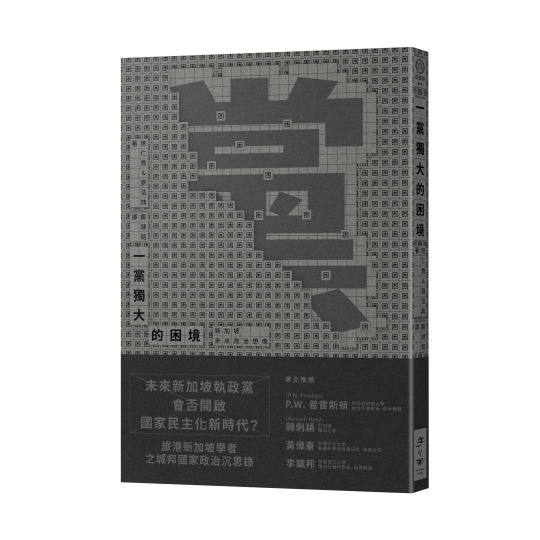
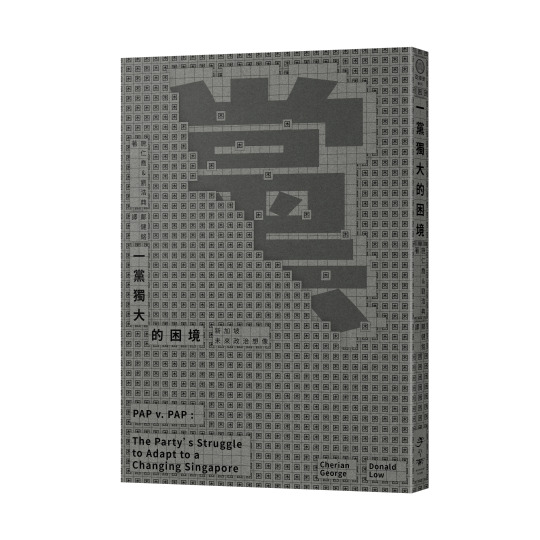
著:施仁喬、劉浩典
譯:鄺健銘
一黨獨大的困境 新加坡未來政治想像
Author : Cherian George, Donald Law
Translator : Kwong Kin Ming
PAP v. PAP :
The Party's Struggle to Adapt to a Changing Singapore
publisher : 季風帶文化 Monsoon Books
148mm x 210mm
unreleased book cover
2021
0 notes
Text
Singaporean ministers can decide what is fake news

Banyan
Singaporean ministers can decide what is fake news
And then order websites and social media firms to delete it
Feb 8th 2020
AS SINGAPORE GRAPPLES with the first cases of local transmission of the Wuhan virus, its government is also worried about another form of contagion: fake news. The two are not unrelated. In late January a Singaporean website claimed that someone in the city-state had died of the virus, when no one has to date. And two Facebook posts claimed, wrongly, that a train station had been closed and cleaned because an infected person had been there.
With an evolving epidemic, false rumours can lead to panic. Cue the Protection from Online Falsehoods and Manipulation Act, or POFMA, which came into force four months ago. A new virus was not what the government had in mind when it framed the legislation, but rather the danger in a multiracial, multireligious society of incitement to hatred or violence based on false rumours. Online lies risked undermining faith in government itself. Such falsehoods were, the government claimed, being weaponised “to attack the infrastructure of fact, destroy trust and attack societies”.
All democracies are grappling with the challenges of fake news. POFMA is the most sweeping response to date. It outlaws any false statement deemed “prejudicial” to public health, security or Singapore’s foreign relations, or which may “diminish” public confidence in government. It gives what Cherian George of Hong Kong Baptist University says is unprecedented discretion to individual ministers to pronounce on what is false or misleading. The minister may demand a correction notice or even the removal of any offending statement or the post or article in which it appears. Sanctions include hefty fines for individuals and companies and up to a year in prison. Ministers’ rulings may be challenged in the High Court. But it can rule only on whether disputed statements are indeed false, not on whether using POFMA is a reasonable response. What if a website exposed an official cover-up of shoddy construction work, say, but stated that the offending minister wore size eight shoes when they were in fact size ten?
Singapore’s minister of communications, S. Iswaran, insists that the new legislation, far from being a sledgehammer, adds finesse in dealing with fake news. “Before this, the only tool you really had was to block or to take down, right?” he says. “Now, you have a tool that allows this spectrum of possibilities.” POFMA’s defenders point out that in none of the ten cases since October have ministers demanded that offending posts be removed, merely that corrections be published. It is about restraint and proportionality, Mr Iswaran says.
Yet POFMA has been invoked mainly against opposition figures, activists and NGOs—at a time when the ruling party is skittish about an approaching general election. In one case the Singapore Democratic Party earned a correction notice for a discussion of unemployment and redundancies among white-collar Singaporeans. Its appeal in the High Court argues that the statistics are not in dispute, merely their interpretation. In another case, a Malaysian watchdog, Lawyers for Liberty, refused to issue a correction to its online claims about how Singapore carries out the death penalty, arguing that the demand curtailed freedom of speech in Malaysia. In response, Singapore blocked its website.
As for social-media companies asked to implement POFMA notices, such as WhatsApp, Facebook and Twitter, dismayed executives say the government has come very late to an understanding of the practical, commercial and ethical challenges. “They seemed to think we are like a bulletin board,” says one. Quite how—and to how many people—a general correction notice gets issued via a platform remains problematic. “One of the things they didn’t quite grasp,” says another executive, “is that they could end up driving people off our platforms really quickly, and that they would lose the audiences they wanted.” It is surely better for the government to get its own message out before policing others’. Yet the health ministry sent out zero tweets between May 3rd and January 29th.
As for Banyan, is he within his rights to call POFMA draconian? Go ahead, says Mr Iswaran, that’s an opinion. Yet the minister is an exception. The government is notoriously thin-skinned. It also lacks a funny bone—and POFMA contains no exemptions for satire. The government’s already frequent resort to the law has become something of a joke among some Singaporeans. Far from protecting citizens’ good opinion of their government, POFMA is undermining it.
This article appeared in the Asia section of the print edition under the headline "Singaporean ministers can decide what is fake news"
https://ift.tt/31Cv2n1
0 notes